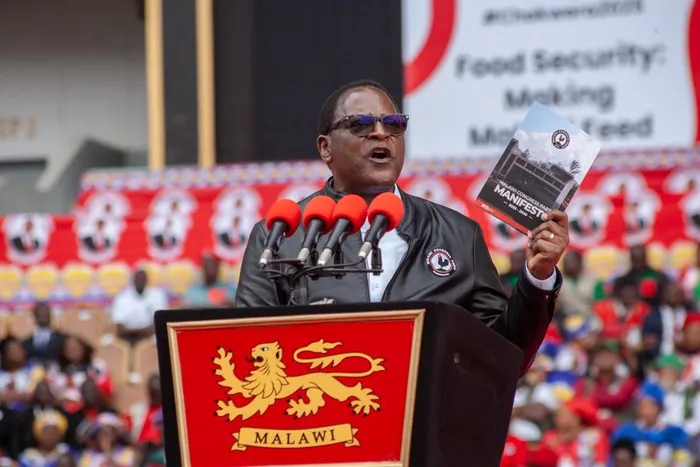Malawi president Chakwera concedes election defeat

Malawi’s incumbent President and leader of the ruling Malawi Congress Party (MCP) Lazarus Chakwera
Image: Amos Gumulira / AFP
Malawi's President Lazarus Chakwera conceded defeat Wednesday in last week's election, saying in an address to the nation that it was clear his rival and predecessor, Peter Mutharika, had an "insurmountable lead".
The dire state of the economy in the small southern African country of 21 million people dominated the September 16 vote, with critics accusing Chakwera of mismanagement and indecisiveness during his first term.
"A moment ago, I called Professor Mutharika directly to congratulate him on his historic victory and to wish him well," Chakwera said just hours before the election authority was due to announce the final results of the vote.
Even ahead of the announcement, "it was clear that my main rival Peter Mutharika had already secured an insurmountable lead over me," said Chakwera, 70, from the Malawi Congress Party (MCP).
The former pastor came to power in a strong win at the 2020 polls against Mutharika, an 85-year-old constitutional law expert from the Democratic Progressive Party (DPP).
However, during his term costs soared in the agriculture-dependent and rural nation, with inflation reaching 33 percent and the price of staple food maize and of fertiliser jumping, a key talking point at the polls.
"In the days that remain, I want you to know that I am committed to a peaceful transfer of power," Chakwera said. "I know that to many of you who supported my campaign for re-election, this outcome is disappointing."
Chakwera said he had already instructed his team to begin preparations to hand over the administration.
On Tuesday, the High Court rejected a last-minute bid by Chakwera to compel the Malawi Electoral Commission to delay releasing the results, after the MCP claimed to have detected irregularities, including tallies that did not match and alleged ballot stuffing.
Chakwera said in his address that he accepted the court's decision. "The anomalies do not necessarily mean that the election result projecting Professor Mutharika as the winner is not credible or a reflection of the will of the people," he said.
The commission, however, needs to "provide a full and transparent account of the irregularities", he said.
Mutharika's DPP campaigned on pledges of a "return to proven leadership" that would fix the economy, including by ending in months a foreign exchange shortage that had restricted imports of fuel and fertiliser.
Voters who backed the reserved politician were swayed by the relatively better state of the economy during his 2014-2020 term, observers said.
He had assembled a strong economic team and brought inflation down to single digits, even though the term was also flawed by allegations of corruption, food shortages and growing national debt.
"Malawians are longing for a better past," said Mavuto Bamusi, political analyst with the Malawi Political Science Association.
"There are some dark spots we should still associate with Mutharika, even if the majority of the voters may think that he is the better president... but only on account of the better management of the economy associated with him in his first term," he said.
In his final campaign rally in the second city of Blantyre, Mutharika said he was standing for re-election because: "I want to rescue this country."
"The country is in trouble, it is suffocating," he said.
The vote that brought Chakwera to power in 2020 with nearly 59 percent of ballots was a rerun of an election the previous year that was nullified after the courts upheld claims of widespread fraud. Mutharika had been slightly ahead in the first take.
Around 7.2 million voters were registered to cast their ballots last week with 17 presidential candidates in the running, even though the race was always dominated by Chakwera and Mutharika and their two parties.
AFP
Related Topics: